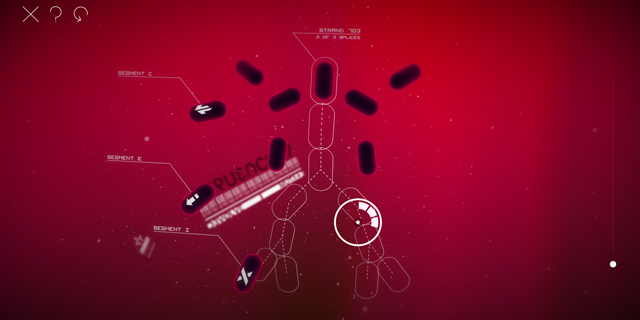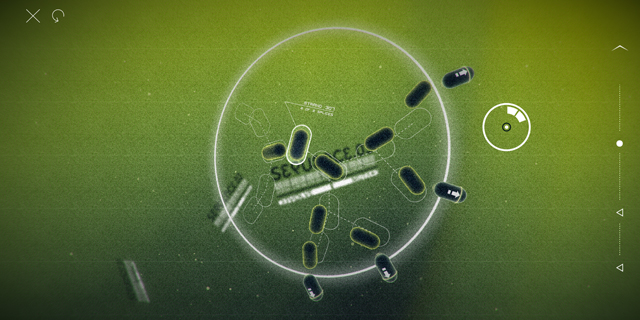
Cipher Prime specializes in games with an unparalleled audiovisual flair. If you’ve played Auditorium, Pulse or Fractal, you’re familiar with the ambience that comes with one of the team’s titles. Splice, Cipher Prime’s new release, has that same sheen, and after some genre experimentation, sees a return to Auditorium‘s heavy-thinking puzzle formula.
Splice, nominally about gene manipulation, is an experience that lies somewhere between Auditorium and SpaceChem. You have formations of cells (and sometimes nearby floating fragments), and you have a certain number of actions to get them into a particular configuration. Complicating matters is that some cells perform actions: one may split and duplicate itself (and anything branching off it), one may extend and create another cell immediately behind it and one may just delete itself and any branching parts. These abilities aren’t actions, but they must be triggered, and they do so in order of increasing distance from the center cell.

The game’s aesthetic takes the standard Cipher Prime look and puts it under a microscope. No, literally. Elements will go slightly in and out of focus, and there’s an occasional bit of static. It’s slick, and it does an admirable job of giving a theme to a game that’s essentially abstract. The soundtrack’s thematic, though with more of an unnoticeable quality than the dramatic builds we’ve seen in past titles.
Cipher Prime knows well how to introduce mechanics in an intuitive way that makes you feel smart. Rather than a traditional tutorial, the game simply does the easiest possible puzzle with the new mechanic at the beginning of the earlier sequences. Each of the main game’s seven parts iterates on a different concept, getting complicated without being insurmountable. There’s no real interface to speak of, with all functions possible by clicking and dragging cells or triggering actions with a right-click.
The resulting game isn’t one that’s particularly challenging, but the team put in the hard stuff elsewhere. During the initial levels, there’s sometimes a way to complete the level in fewer moves than allotted. Doing this gets you an “Angelic” rating for the level (rather than the usual “Success”), and it’s fun to find these when you can. On the other end, there are series of especially-difficult “Epilogue” levels to really test your configuration skills.
Splice doesn’t do anything particularly astounding, and there’s not a never-ending well of content here (though what’s here is substantial), but you can’t deny that Cipher Prime executes its ideas with unnatural precision.
Pros: Great aesthetic, intuitive controls
Cons: Much of the puzzles can be blown through quickly



















